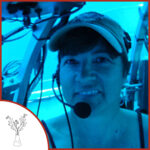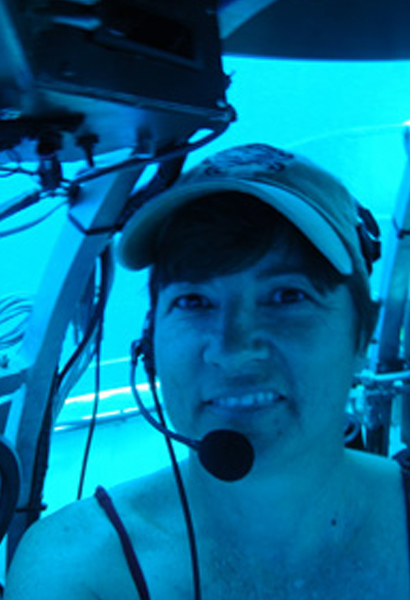

Birth: June 11, 1951
Specialty: Oceanography, Marine Biology
Major Contributions:
Former director, Bioluminescence Department, Harbor Branch Oceanographic Institution
Co-founder, CEO, and Senior Scientist, Ocean Research & Conservation Association
Part of team that successfully filmed a live giant squid (Architeuthis dux) in its natural habitat for the first time
Image: Wikimedia (CC BY-SA 3.0)
Dr. Edith Widder is an oceanographer, bioluminescence expert, a certified scientific research pilot for Atmospheric Diving Systems, and an inventor.
After earning her doctorate, she decided to study ocean creatures that were bioluminescent, those can make their own light, but found that the instrumentation to study these animals didn’t really exist. So, she started designing and making her own equipment.
Working with engineers she conceived and built several unique devices to help humans see beneath the surface in new ways. In 2005 she co-founded the Ocean Research and Conservation.
In 2012 she was part of a team of scientists that were able to obtain the first footage of a living giant squid in its natural habitat. Widder was invited to be part of the team due to talks she had given on using quiet unobtrusive viewing equipment and visual luring. She thought that attracting animals instead of scaring them away would be more beneficial in trying to observe sea life.
Widder had noticed that using certain submersible vehicles yielded better results and she experimented with recording the propulsion sounds of each. She found that those with electric motors made much less noise that could be disturbing ocean creatures.
So, she designed a rig called the Medusa, with no propulsion, a battery powered camera, and an optical lure comprised of a blue light. The lure was designed to mimic a deep-sea dwelling jellyfish that uses bioluminescence as a defense mechanism. When this jelly is attacked it sets off light to try and attract something that will attack its attacker–like a giant squid. This approach was wildly successful, capturing live images of a giant squid six times.
It was in 2019 that a team led by Widder was able to be the first to film a giant squid in US waters. In 2021 Widder published Below the Edge of Darkness to share her journey into the deep ocean. Widder would like to see an ocean exploration program on the national level much like NASA is for space exploration. She says we need to be exploring and protecting our life support systems here on Earth and that exploration is the engine that drives innovation and innovation drives economic growth.
Written by Angela Goad
Sources:
Ocean Research & Conservation Association: Dr. Edit Widder
Gulf of Maine Times: Q&A: Edith Widder, MacArthur Fellow
See Also:
Ocean Research & Conservation Association
